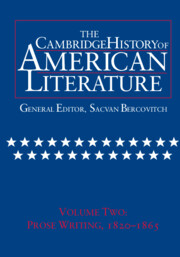Book contents
- Frontmatter
- Introduction
- CONDITIONS OF LITERARY VOCATION
- THE LITERATURE OF EXPANSION AND RACE
- THE TRANSCENDENTALISTS
- 1 Unitarian Beginnings
- 2 The Assault on Locke
- 3 Carlyle and the Beginnings of American Transcendentalism
- 4 “Annus Mirabilis”
- 5 The Establishment and the Movement
- 6 Letters and Social Aims
- 7 The Hope of Reform
- 8 Diaspora
- 9 The Antislavery Years
- NARRATIVE FORMS
- Chronology
- Bibliography
- Index
5 - The Establishment and the Movement
from THE TRANSCENDENTALISTS
Published online by Cambridge University Press: 28 March 2008
- Frontmatter
- Introduction
- CONDITIONS OF LITERARY VOCATION
- THE LITERATURE OF EXPANSION AND RACE
- THE TRANSCENDENTALISTS
- 1 Unitarian Beginnings
- 2 The Assault on Locke
- 3 Carlyle and the Beginnings of American Transcendentalism
- 4 “Annus Mirabilis”
- 5 The Establishment and the Movement
- 6 Letters and Social Aims
- 7 The Hope of Reform
- 8 Diaspora
- 9 The Antislavery Years
- NARRATIVE FORMS
- Chronology
- Bibliography
- Index
Summary
In the early months of 1837 the Transcendentalists began to think of themselves as something more than a group of young clergy eager to escape the circumspection of traditional Unitarian associations for regions of freer speech. The manifestos of 1836 had given the writers a collective visibility. Now, as conservatives began writing angry reviews and warning against the errors of the “new school” of philosophy and religion, the members of Hedge's Club suddenly found themselves elevated to the dignity of rebels.
Bronson Alcott was the most savagely assaulted, but by the end of January Emerson too found himself the target of conservative scorn. In the January 1837 issue of the Christian Examiner a young Harvard tutor named Francis Bowen made a review of Nature the occasion for an attack upon the arrogance and obscurantism of the whole Transcendentalist school. As a reviewer of Nature itself Bowen was perceptive; he noticed that Emerson's love of Saxonisms and deliberate bathos were a kind of protest against “forced dignity and unnatural elevation,” and he declared himself bewildered by the sudden change of direction in the second half of the book, when Emerson suddenly aims a “back blow” at the universe he was teaching us to admire and love.
Yet Bowen's praise for the “beautiful writing and sound philosophy” he found in the book quickly changed to blame when he considered a doctrine in Nature that he found dangerous: its worship of intuition as the sole trustworthy guide in matters of the spirit. Bowen agrees that mathematical axioms must be grasped intúitively, but he cannot leap with Emerson to the conclusion that intuition can grasp “the most abstruse and elevated propositions respecting the being and destiny of man.”
- Type
- Chapter
- Information
- The Cambridge History of American Literature , pp. 392 - 423Publisher: Cambridge University PressPrint publication year: 1995



